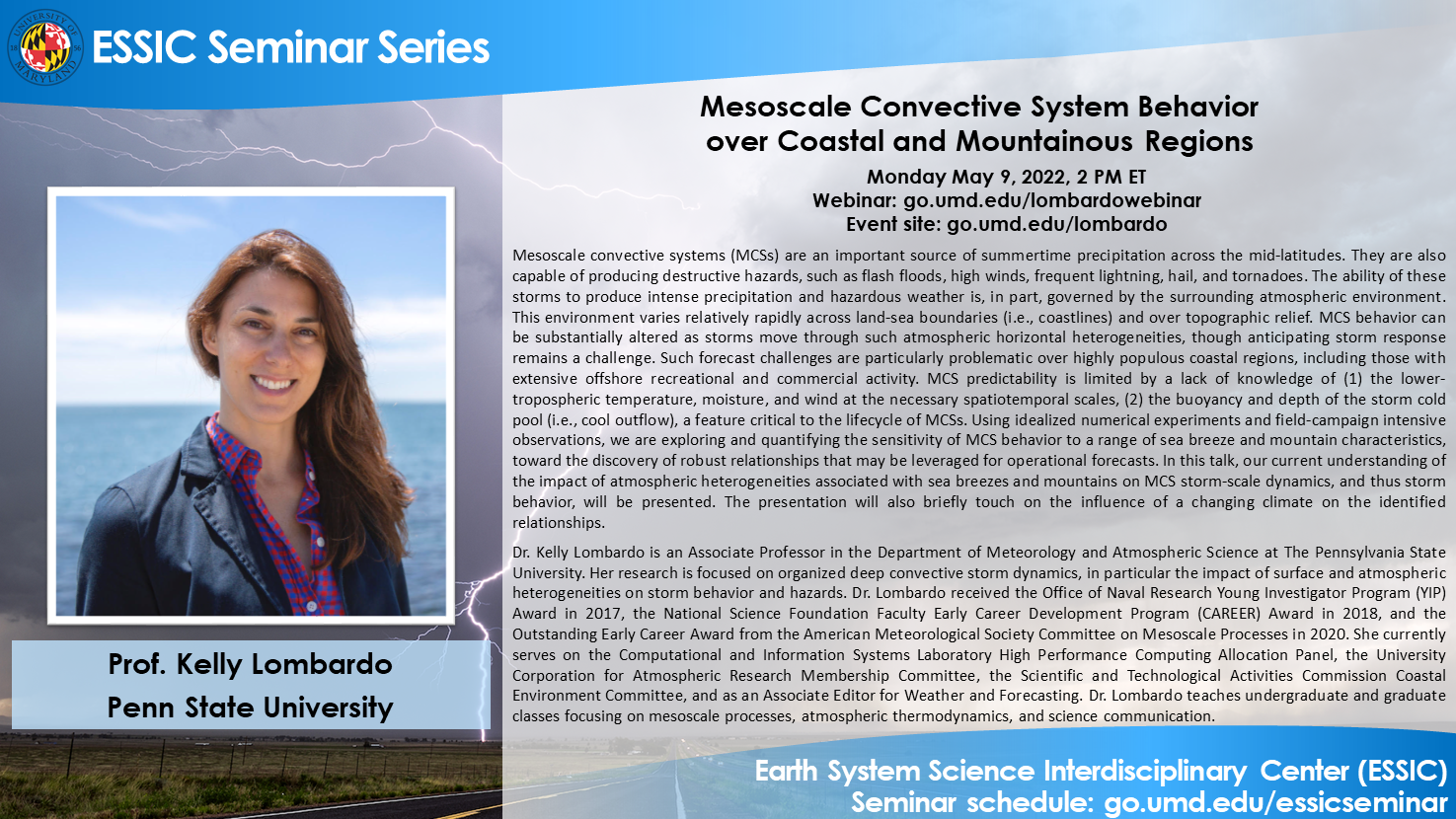
Mesoscale Convective System Behavior over Coastal and Mountainous Regions
This event has passed. View the seminar recording here:
Prof. Kelly Lombardo
Pennsylvania State University
Monday May 9, 2022, 2 PM ET
Abstract:
Mesoscale convective systems (MCSs) are an important source of summertime precipitation across the mid-latitudes. They are also capable of producing destructive hazards, such as flash floods, high winds, frequent lightning, hail, and tornadoes. The ability of these storms to produce intense precipitation and hazardous weather is, in part, governed by the surrounding atmospheric environment. This environment varies relatively rapidly across land-sea boundaries (i.e., coastlines) and over topographic relief. MCS behavior can be substantially altered as storms move through such atmospheric horizontal heterogeneities, though anticipating storm response remains a challenge. Such forecast challenges are particularly problematic over highly populous coastal regions, including those with extensive offshore recreational and commercial activity. MCS predictability is limited by a lack of knowledge of (1) the lower-tropospheric temperature, moisture, and wind at the necessary spatiotemporal scales, (2) the buoyancy and depth of the storm cold pool (i.e., cool outflow), a feature critical to the lifecycle of MCSs. Using idealized numerical experiments and field-campaign intensive observations, we are exploring and quantifying the sensitivity of MCS behavior to a range of sea breeze and mountain characteristics, toward the discovery of robust relationships that may be leveraged for operational forecasts. In this talk, our current understanding of the impact of atmospheric heterogeneities associated with sea breezes and mountains on MCS storm-scale dynamics, and thus storm behavior, will be presented. The presentation will also briefly touch on the influence of a changing climate on the identified relationships.
Biosketch:
Dr. Kelly Lombardo is an Associate Professor in the Department of Meteorology and Atmospheric Science at The Pennsylvania State University. Her research is focused on organized deep convective storm dynamics, in particular the impact of surface and atmospheric heterogeneities on storm behavior and hazards. Dr. Lombardo received the Office of Naval Research Young Investigator Program (YIP) Award in 2017, the National Science Foundation Faculty Early Career Development Program (CAREER) Award in 2018, and the Outstanding Early Career Award from the American Meteorological Society Committee on Mesoscale Processes in 2020. She currently serves on the Computational and Information Systems Laboratory High Performance Computing Allocation Panel, the University Corporation for Atmospheric Research Membership Committee, the Scientific and Technological Activities Commission Coastal Environment Committee, and as an Associate Editor for Weather and Forecasting. Dr. Lombardo teaches undergraduate and graduate classes focusing on mesoscale processes, atmospheric thermodynamics, and science communication.
Webinar:
Webinar: https://go.umd.edu/lombardowebinar
Event site: https://go.umd.edu/lombardo
Webinar number: 2620 931 7090
Webinar password: essic
To join the audio conference only:
US Toll: +1-415-655-0002
Global call-in numbers
For IT assistance:
Cazzy Medley: cazzy@umd.edu
Resources:
Seminar schedule & archive: https://go.umd.edu/essicseminar
Seminar Google calendar: https://go.umd.edu/essicseminarcalendar
Seminar recordings on Youtube: https://www.youtube.com/user/ESSICUMD

